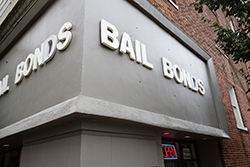If you are short on time, the answer is it depends. Each jail is different, the smaller local city jails and police stations, sheriff sub stations are typically the quickest to be released from and often take less than an hour to process a bond and get out of jail. Since they are simply smaller and usually run more efficiently. The larger county jails, such as Los Angeles County, California have thousands of people be arrested, booked, processed and hundreds being released on bail, some being transferred to other facilities, some needing medical care and others being released on OR (own recognizance) that the process at these large county facilities often takes between 6-8 hours to be released after bail is posted. This is in addition to the 6-8 hours it takes to be booked into the facility to begin with. Also, note that holidays and weekends tend to be busier times for arrests and can often delay the release process. The fastest way to ensure a release from jails in California is with the use of bail bonds services.
When it comes to getting released from jail, there are a number of factors that play a role. If you want to post bail to make sure that someone is released, it's vital to understand the entire process, including how long it takes.
What Is the Process of Posting Bail?
If you are to be released from jail after being accused of committing an offense, you or somebody on your behalf should provide the full bail amount either to the arresting agency or to the county court clerk. When the defendant attends court, they can receive the bail refund between 60 to 90 days after the case is completed. If they fail to appear for said court appearances, they are likely to forfeit the money and result in a warrant for their arrest.
When the bail amount is set, the full amount should be paid for the defendant to be released from jail, which could be paid in cash, collateral like property, or with a surety bond such as from a bail bond company. The amount of bail can vary depending on a number of factors, but a loose framework usually involves the bail amount being set according to the crime.
For misdemeanors like Violation of Probation (PC 1203.2), bail is set at $5,000, which is at the lower end of the spectrum. Conversely, more severe cases such as Exhibiting a Firearm (PC 417(a)(2)) are set at $10,000, and Possession of Underage Obscenity (PC 311.11(a)) is set at $10,000.
For felony charges, bail for Inducing a Minor to Commit a Drug Offense (HS 11343.2(a)(1)) is set at $10,000, Commission of Drug Offense Near School (HS11353.6(b)) is set at $40,000, and Discharging a Firearm in the commission of Felony (PC 12022.53(c)) is set at $200,000.
While there are numerous bail amounts, as you can see, there are a wide variety of felonies and misdemeanors that can result in the bail amount being set. When securing bail for somebody else, you are classified as the co-signer and are responsible for ensuring the defendant shows up at the court appearances, making you potentially liable if they fail to show.
What Are the Conditions of Making Bail?
The bail schedule could be changed according to the specifics of the case in question and the defendant's criminal history. For example, if the defendant is classified as a flight risk, which refers to the individual being considered likely to leave the country before the bail hearing or court appearance, it is likely they will get denied. When somebody is released with or without bail, it is essential to comply with requirements set by the judge to stay out of custody during the case. For example, it may be essential for the defendant to comply with one or more of the following:
- Electronic monitoring, such as tagging
- Travel or driving restrictions
- House arrest
- Completing a treatment program, for example, mental health or substance abuse
- Obeying an order to surrender weapons to law enforcement
- Check-ins with a probation officer
How Long Can You Be Held After You Post Bail? The answer will depend on the case in question. There are a few factors that play here that can result in the ongoing incarceration of a defendant. Some of the factors include:
- The judge. If the judge has a particularly large workload, for example, following peak seasons like weekends or holidays, this could prolong the amount of time it takes to release the defendant from jail.
- Paperwork. The process of getting a defendant out of jail requires a lot of administration. In many cases, the officer overseeing the release of the bond must check everything before they can release the defendant, which will add to the waiting time. The officer may need to check a number of extenuating circumstances, for example, if a defendant has multiple warrants. If the defendant is in jail for a first offense, this may speed up the process, but it's not guaranteed.
- The number of staff working. If the particular jailhouse where the defendant is held is short-staffed, this will naturally add to the length of time it takes to process the release.
- How busy the jail is. If there is a lot of traffic with many defendants, this will also have an impact on how long it takes.
Additionally, when bail is posted, the defendant's name is added with the other detainees, and it could just be the luck of the draw that the defendant's name is at the top of the list.
What Is the Bail Bond Process?
The bail bond process is just as important as understanding how bail bonds work. The bail bond process typically consists of the following stages:
- Processing and booking, which consists of being taken into custody, having photographs and fingerprints taken, and a background check. After this, bail is set according to the county they were arrested for.
- Bail is set, where the bond payment amount is dictated according to the bail schedule. This is set by the judge, and once the bail amount is set, the defendant can either post bail or wait in custody for their court date and trial.
- Contacting a bail bondsman, where they will ask questions about the defendant and the circumstances of their arrest.
- Application and contract drawn out by the bondsman, which the co-signer signs.
- Release of the defendant after the paperwork is completed and the bond is paid for. The agent is responsible for posting it, which then triggers the release of the defendant.
- The exoneration of the bond upon the defendant satisfying the obligations of the court.
A Few Extra Things To Know About Bail Bonds
The process can seem overwhelming, and there are a few extra things defendants and co-signers should know:
- A person can be out on a bail bond for a specific amount of time. Typically, states will allow the bail bond to last between 90 and 120 days; however, this will depend on the crime in question and the criminal record of the defendant. The time frame of that bond will last up until the date of the trial, so there is no chance of the defendant being put back in jail prior to court proceedings.
- The cost of bailing somebody out depends on the bail bondsman in question. The cost typically equates to around 10% of the set bail amount, but there are a number of different factors here that can dictate the final cost. There are also other amounts that can be paid, for example, 6% or even as low as 0%, but these will depend on if the defendant has more than one co-signer and a great credit record. Even in these situations, the bail bondsman will need to guarantee the defendant's and co-signer's compliance, and it may be necessary to put up collateral like a car or a property.
- Bail bond companies operate 24/7; therefore, it is possible to get the process of posting bail started at any time. But, as already mentioned, there are a number of factors that will prolong the release of the defendant. If you need to get in touch with a bail bond company, Mr. Nice Guy Bail Bonds can help you out 24/7.
The fastest way to ensure a release from jails in California is with the use of bail bonds services. Bail bond companies such as Mr. Nice Guy Bail Bonds have years of experience and local expertise in navigating jails and courts and can expedite defendants' release on bond. Contact us for an accurate estimate of the current release times for the local facility.







